
Teenagers should eat better oil
Adults often talk about their carefree school days, lamenting that "you don't know what it's like to be young". Today's students face challenges such as social competition, family changes, the only-child problem, excessive use of social media, and long-term "mask life". Children and adolescents have more intense mood swings, affected by parental expectations, academic pressure, competition for admission to higher education, peer relationships, and physical changes. Adolescents are more sensitive and are more likely to have mental health problems.
PART 01
50% of depression patients are students
Children's psychological problems are actually far beyond adults' imagination
The results of two mental health studies published in 2022 are deeply worrying.
First, the Institute of Psychology of Renmin University of China conducted a systematic study on the detection rate of mental health problems among nearly 3.25 million college, middle school and primary school students in my country. The results showed that:
Among primary school students, the detection rates of mental health problems are sleep problems (25.2%), depression (14.6%), anxiety (12.3%), etc.;
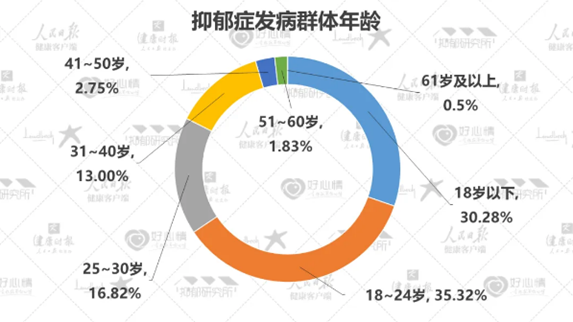
Among junior high school students, the main problems are anxiety (27%), depression (24%), self-harm (22%), sleep problems (17%), etc.;
Among high school students, the main problems are depression (28%), anxiety (26.3%), sleep problems (23%), etc.;
Among college students, the main problems are sleep problems (23.5%), depression (20.8%), self-harm (16.2%), anxiety (13.7%), etc.

Secondly, the "2022 National Depression Blue Book" released by the People's Daily Health Client and Health Times shows that the incidence of depression is showing a trend of younger people, with the prevalence of adolescent depression being 15-20%; patients with depression under the age of 18 account for 30% of the total number. Among patients with depression, 50% are students. Some studies have shown that depression in adulthood has already shown signs of onset in adolescence.
PART 02
Autonomic Nerve
Chinese students generally have mental health problems such as depression, anxiety, and sleep problems. The overall situation is worrying and needs to be taken seriously by the society. Parents often pay too much attention to their children's physical health and ignore the importance of mental health. However, each child has different psychological qualities, and the long-term accumulation of negative emotions may lead to mental illness.
It is crucial to prevent mental health problems, otherwise it may lay hidden dangers for psychological disorders in adulthood. The saying "A happy childhood heals a lifetime, and an unhappy childhood requires a lifetime to heal" has a scientific basis.
Negative emotions can affect physical health. For example, test anxiety can lead to insomnia, headaches and other symptoms. These reactions are manifestations of autonomic nervous system regulation.
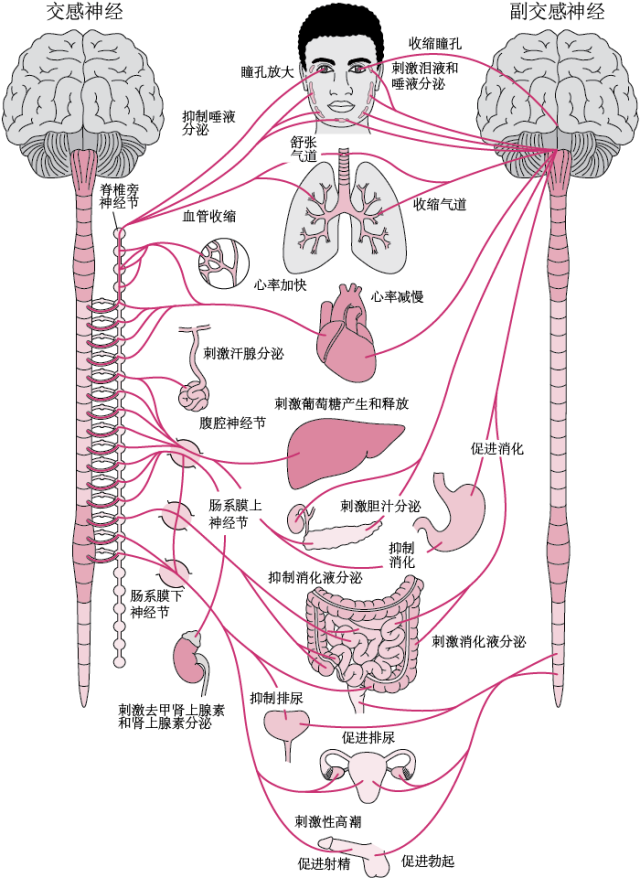
The autonomic nervous system, also known as the "visceral nervous system", mainly regulates activities related to the internal organs and is an important part of the nervous system. Its regulation is unconscious, that is, autonomous, and not controlled by subjective consciousness, so it is also called the "autonomic nervous system". It is widely distributed in the body and has a certain degree of independence. It can spontaneously adjust the body's state according to changes in the internal and external environment, such as high and low blood pressure, heart rate, saliva secretion, sweating, urination, etc.
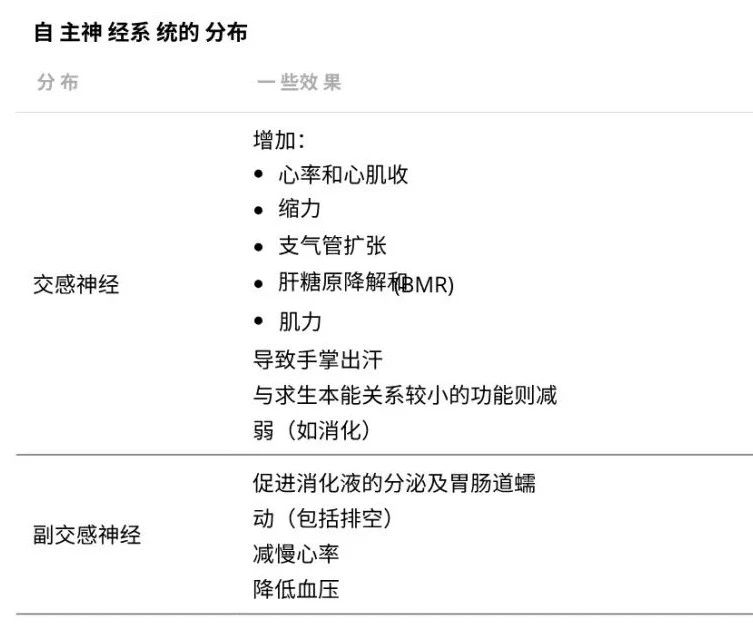
PART 03
Regulation of oryzanol on autonomic nerves
Long-term psychological stress may lead to autonomic dysfunction and even depression, and increase the risk of cardiovascular disease. Positive emotions and mentality are crucial for students. In addition to professional psychological counseling, a healthy lifestyle and proper nutritional intervention are also essential. Reasonable dietary habits and diversified food intake help regulate the nervous system, and active substances such as oryzanol in plant foods can maintain the stability of nerve function.

Oryzanol is present in many foods, such as brown rice, whole wheat oats and beans, especially the skin of brown rice, which is a precious nutrient in grains. However, the white rice we often eat now has the skin of brown rice ground off, including the germ and outer bran of rice. Rice oil is extracted from rice bran by physical pressing or solvent extraction. The oryzanol content is about 1-2%, which is one of the important bioactive substances in rice oil.
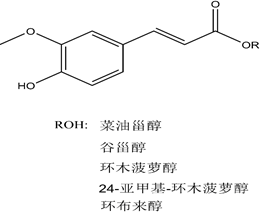
Oryzanol structure: esters of ferulic acid, triterpenoids and phytosterols
Oryzanol was first discovered by Japanese scholar Chitaro Tsuchiya in 1953. He found sterol and triterpenoid ferulic acid esters in cereal oils and named it oryzanola, which means a new vitamin in rice. Its Chinese name is oryzanol. After cooperation with the medical community, the pharmacology, toxicology and clinical effects of oryzanol in regulating autonomic nerves have been clarified.
Oryzanol has antioxidant activity and has a protective effect on the nervous system, especially in regulating autonomic nerve function. It can relieve fatigue, soothe the nerves and help sleep, and reduce anxiety and depression. Some scholars conducted a study on 283 sophomores and found that after supplementing with oryzanol, 73% of the students were relieved from exam tension, and 80% of the students had significantly improved sleep before the exam. This shows that oryzanol can relieve students' tension and exam anxiety to a certain extent, and improve their test-taking ability.
PART 04
Widely used
Oryzanol: both a food nutrient and a drug active ingredient
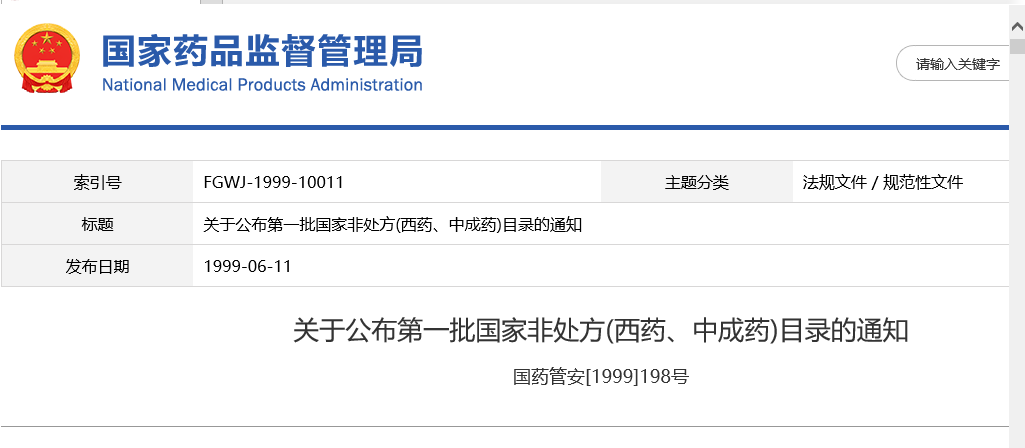
Oryzanol has been used in the food industry for more than 30 years. Countries such as Japan and the United States have recognized its importance as a functional food ingredient or dietary supplement. Oryzanol is also widely used in the medical field.
In 1999, the China Food and Drug Administration included oryzanol in the first batch of national over-the-counter drug catalogues for the treatment of autonomic dysfunction. Oryzanol is one of the commonly used anti-neural disorder drugs. It mainly acts on the autonomic nervous system and secretion center of the diencephalon, and can regulate autonomic nervous function, regulate endocrine balance disorders, and improve symptoms of mental disorders.
The application of oryzanol in medicine demonstrates its potential for regulating the function of the nervous system, especially in the treatment of autonomic dysfunction and other problems.
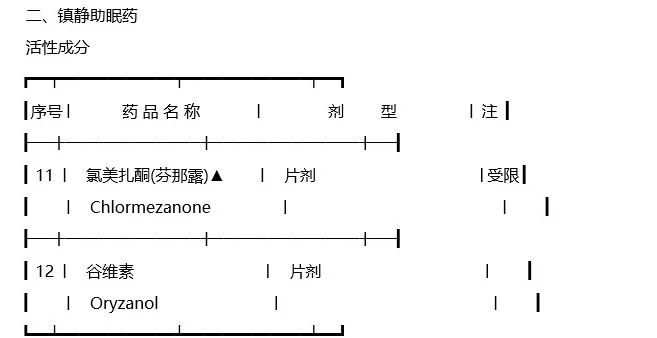
Oryzanol was included in the first batch of national over-the-counter drug catalogue

Diet is better than medicine. Diet is the cornerstone of students' physical and mental health. Improving the quality of diet and eating more foods rich in oryzanol can help nourish the nervous system and enhance mental health. Families and parents are crucial to the emotional health of teenagers. They should provide spiritual care, pay attention to children's changes, resolve problems with concern, and avoid chain reactions caused by trivial matters.










